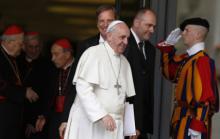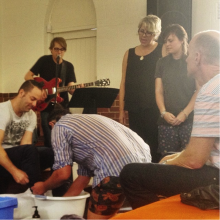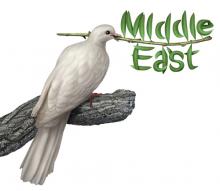Peace

The visit of Pope Francis to Palestine, though initially intended to be a simple ecumenical meeting with the Patriarch of Constantinople, has turned into an enormous opportunity for His Holiness to reaffirm his commitment to peace and justice in a land that so desperately craves these things.
Francis’ visit is both timely and crucial. We Palestinians heard him clearly when he said: “We must restore hope to young people, help the old, be open to the future and spread love. Be poor among the poor. We need to include the excluded and preach peace.”





Over banana beer and fried plantains, we sat around a communal table—us and them. Together with both a victim and a perpetrator of genocide, it seemed impossible. My mind could not comprehend the juxtaposition I was seeing with my eyes—from betrayal into brotherhood, these men came. As they sat beside each other, I felt as if I were watching a live screen play of a fantastical story propagating the ideal picture of justice and reconciliation. But there was no fanfare of propaganda, no idealized sermon—just their painfully honest and vulnerable journey toward friendship. Their presence was humbling and their hearts, full of truth. Every detail of their innermost fears and failures came to life and I was left in awe.
In the various situations in my life, I’ve often asked myself this question: Which is easier—to forgive or to seek revenge? My human nature automatically errs toward seeking revenge—I’ve attempted to “punish” with silence or take away what I formerly gave as a way of protecting my broken heart. In desperation, I cling to what I know is “right.” It’s easier to identify with the victim, but to identify with the convicted? I’d rather not.


Oh, Sarah Palin.
So you’ve most likely heard Sarah Palin used baptism as a metaphor for waterboarding terrorists. (I mean I heard and I’m in Australia!) I found out when fellow neo-Anabaptist Tyler Tully sent me his reflections. Many are blogging thoughtful responses. But more and more this is my conviction: the best critique of the bad is the practice of the beautiful. So I want to testify to the beauty of the baptisms I was a part of on Sunday.
I do so knowing that the despondence and darkness I feel when baptism is equated with the diabolical is driven out in the joy of the mystery of what happen when we say yes to the Holy Spirit by wading in the water. Our new sister Natha, brother Ky, and I met separately in the End Poverty movement. Both of them, in quiet different ways, found themselves being found by God while looking for a better world. And in Jesus they found the world they were looking for has started! Without a dry eye in the community that surrounded them on Sunday, they shared their wanderings in the wilderness before following Jesus through the waters.





In early April, the U.S. Navy unveiled its Mach 7 Magnetic Mangler, “a railgun straight out of Star Trek that can take out targets at 100 miles with a projectile flying at nearly 7,000 feet per second.” So far, the U.S. military has spent $240 million developing the railgun over a period of 10 years. CBS News reports that the railgun won’t go to sea until 2016, but one article, published in The Gazette, suggests that the U.S. military may have decided to show off the Magnetic Mangler in order to send a message to the Russian government.
In advance of the University of Wisconsin's recent “Resources for Peace” conference, a professor friend asked participants to consider whether the increasing competition for depleted global resources, for goods to meet essential human needs, would tend inevitably to make people less humane. She was thinking particularly about what she termed “the shrinking humanism” seen in dystopian novels and films that portray cruelty and violence among people who fear for their survival.

“You are not only a coward but a non-believer as well.”
It may not quite be at the level of Captain America’s vibranium shield, but my skin is a lot thicker than it used to be. When you start a blog that promotes something as insanely unorthodox as the idea that the author of Genesis 1-3 might have (like most other biblical authors) made use of a metaphor here and there, you come to expect that some fundamentalists are going to call Father Merrin and start reaching for the holy water.
It’s unfortunate — and, often, perplexing — but you learn to get used to it.
Even so, there are times I receive emailed messages like the one quoted above, and it hits like a punch in the gut. I know I should just ignore such trollishness. Usually I can. But not always.
Don’t worry, though. This is not a whiny column about how mean the conservatives are to us open-minded, forward-thinking progressives. Instead, it’s about how messages like this are helping me rethink almost everything I thought I knew about the Christian faith.


On March 28 at about 4 p.m., the Afghan Peace Volunteers heard a loud explosion nearby. For the rest of the evening and night, they anxiously waited for the sound of rocket fire and firing to stop. It was reported that a 10-year-old girl, and the four assailants, were killed.
Four days later, they circulated a video, poem and photos prefaced by this note:
“We had been thinking about an appropriate response to the violence perpetrated by the Taliban, other militia, the Afghan government, and the U.S./NATO coalition of 50 countries.
So, on the 31st of March 2014, in building alternatives and saying ‘no’ to all violence and all forms of war-making, a few of us went to an area near the place which was attacked, and there, we planted some trees. -- Love and thanks, The Afghan Peace Volunteers"


DEALING WITH IRAN is complex for many reasons. This is not a made-up country whose borders were dictated by politicians in the last century; it is Persia—the great empire that fought with Greece before the beginning of the Christian era, the Asiatic power that imperial Rome was never totally able to subdue. From that long history emerged a people with a deep sense of proud history and a realization of national sovereignty that helps guide the destiny of the nation and its peoples.
I recall a conversation years ago with then-Iranian President Mohammad Khatami about nuclear power. He was not in favor of creating weapons of mass destruction, but he clearly promoted Iran’s right to develop nuclear energy for peaceful purposes. To deny this right is an affront to national sovereignty, he argued.
After the unfortunate history of the past government, once again Iran is governed by a president and a cabinet that call for peaceful nuclear development and for a new and more open relationship with the West. This is the fact that has emerged into a clear interim agreement between the so-called P5+1—the members of the U.N. Security Council plus Germany—and Iran. As reported, the goal of ongoing negotiations is to open the door to a 24/7 inspection of nuclear facilities and other guarantees to ensure that Iran will not make nuclear weapons.
The fact that the new president and his foreign minister are talking with the United Nations, and with Western leaders in particular, gives the world a better check on the nuclear ambitions of Iran than we have on any other nation in the region that stretches from the Mediterranean to the Indian Ocean. If in the terrible, and most unlikely, event that a government of Iran should change its position and decide to build a nuclear weapon, the world would know almost immediately because of the security and surveillance that are likely to be part of a permanent agreement. In such an eventuality, it would be possible to reinstitute the former sanctions or even impose more stringent ones.

IS IT WRONG for a Christian to pray to Allah? When a Muslim worships Allah, is she worshiping God?
Questions like these have arisen with more urgency than usual in the months since a Malaysian lower court ruled in October that the word “Allah” was exclusive to Muslims and therefore the Herald, a Malay Catholic newspaper, could not use the word “Allah” in print. (The decision is currently under appeal.)
Many Christians lament the lower court’s decision. They see it as an infringement on the rights of religious minorities. But other Christians welcome the ruling. They claim that it actually helps Malaysian Christians by protecting them from confusion and preventing them from making a grave mistake.
For example, Albert Mohler, president of Southern Baptist Theological Seminary here in the U.S., has argued that Christians should not call upon the God of the Bible using the word “Allah,” because “Allah” refers only to the god of the Quran, a god who is radically different from the true God of Jesus Christ.
Whether Mohler and those who agree with him are right carries dramatic implications. If they are, then prospects for respectful, trusting cooperation between Christians and Muslims are slim. There is one and only one God. If Christians believe that Muslims do not worship that God, then we must believe that Muslims worship nothing, an empty, created idol, or else something demonic. The claim to worship the one and only God is one of the most central claims of Islam. No matter how respectfully a Christian denied that claim, it would be difficult for most Muslims to receive that rejection. Mutual respect is an important ingredient in public cooperation. Thus cooperation between Christians and Muslims would be impeded. Even more disconcertingly, if the bulk of Christians held, as some do now, that Muslims actually worship a demonic force, then those Christians would have compelling reasons not to cooperate with Muslims. To do so would be to cooperate in opposition to God.
